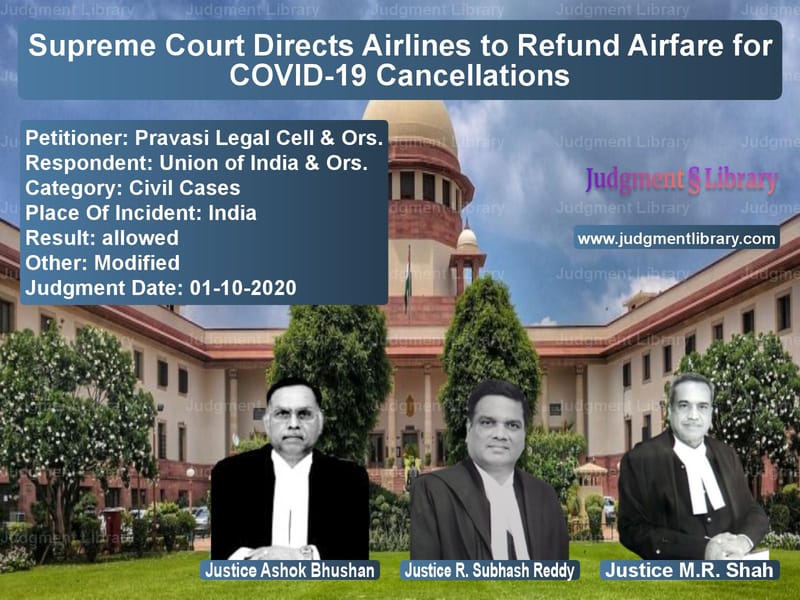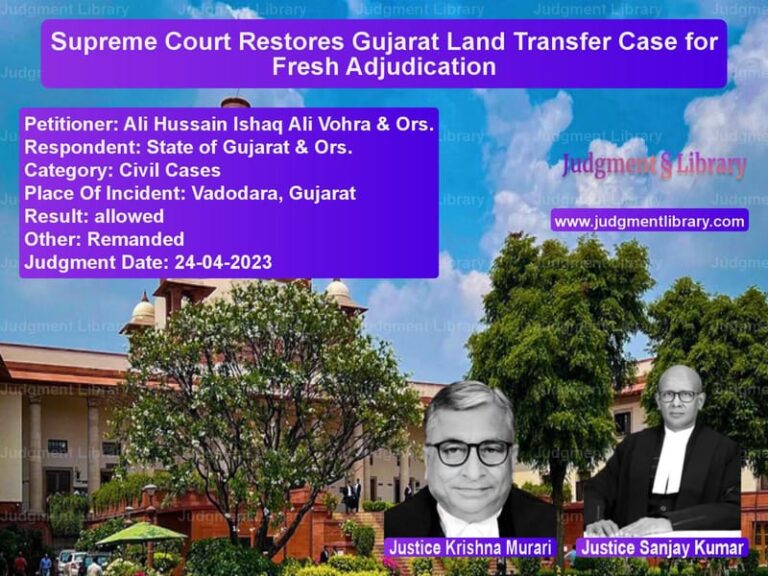Supreme Court Directs Airlines to Refund Airfare for COVID-19 Cancellations
The case of Pravasi Legal Cell & Ors. vs. Union of India & Ors. is a landmark Supreme Court ruling addressing the grievances of airline passengers who faced difficulties in obtaining refunds for flight cancellations during the COVID-19 lockdown. The petitioners, including various consumer rights organizations and affected individuals, challenged the actions of airlines that issued credit shells instead of full refunds for canceled flights.
The judgment emphasizes the protection of consumer rights, holding that passengers are entitled to a full refund for flights that were canceled due to government-imposed travel restrictions. The Court laid down specific guidelines to ensure compliance with the refund policy.
Background of the Case
The case arose in response to widespread complaints from passengers who had booked flights for travel during the COVID-19 lockdown but were denied cash refunds by airlines. The government-imposed travel bans led to mass flight cancellations, and airlines instead offered credit shells, allowing passengers to rebook flights at a later date.
The petitioners, including the Pravasi Legal Cell and the Air Passengers Association of India, filed public interest litigations (PILs) under Article 32 of the Constitution, arguing that airlines were violating the Civil Aviation Requirements (CAR) issued by the Directorate General of Civil Aviation (DGCA), which mandate refunds for canceled flights.
Legal Controversy
The primary legal issue was whether airlines were obligated to provide immediate cash refunds for canceled flights or whether they could retain passenger funds as credit shells. The petitioners contended that:
- Passengers should receive a full refund without deductions.
- The government’s Office Memorandum dated 16 April 2020 only covered refunds for tickets booked during the lockdown and failed to protect passengers who had booked flights before restrictions were announced.
- Issuing credit shells instead of refunds violated consumer rights.
Petitioners’ Arguments
The petitioners, represented by senior advocates Sanjay Hegde and C.A. Sundaram, argued:
- The airlines’ refusal to refund was arbitrary and violated the CAR.
- The lockdown was an unforeseen event, and passengers should not bear the financial burden.
- Passengers should have the option to request a full refund instead of being forced to accept credit shells.
- Credit shells were impractical as many passengers were unsure when they would be able to travel again.
Respondents’ (Airlines and Government) Arguments
The respondents, represented by Solicitor General Tushar Mehta on behalf of the government and senior advocates representing major airlines, countered:
- The airline industry suffered significant financial losses due to the pandemic, and refunding all tickets immediately would create a liquidity crisis.
- The Ministry of Civil Aviation had already issued guidelines allowing credit shells, which were an acceptable compromise.
- Providing immediate refunds would negatively impact airline operations, leading to job losses and financial instability.
Supreme Court’s Observations and Judgment
The Supreme Court, in its ruling delivered by Ashok Bhushan, R. Subhash Reddy, and M.R. Shah, made the following key observations:
- Passengers’ Rights to Refund: The Court held that passengers who had booked flights before or during the lockdown had the right to a full refund if their flights were canceled due to government-imposed travel bans.
- Credit Shells Cannot Be Mandatory: The airlines’ practice of issuing credit shells instead of cash refunds was deemed unfair unless passengers voluntarily opted for credit shells.
- Financial Impact on Airlines: While acknowledging the financial distress faced by airlines, the Court ruled that passenger rights should not be compromised.
- DGCA’s Role: The Court directed the DGCA to ensure strict compliance with refund policies.
Final Judgment
The Supreme Court issued the following directives:
- Passengers who booked tickets during the lockdown for travel within the lockdown period are entitled to a full refund within three weeks of cancellation.
- Passengers who booked tickets before the lockdown for travel during the lockdown are also entitled to a full refund.
- Credit shells should only be issued if the passenger voluntarily agrees to it.
- Credit shells must be transferable and should be valid until 31 March 2021.
- Passengers who do not use their credit shells by the deadline must receive a full refund from the airline.
- DGCA must monitor compliance and take action against airlines that fail to process refunds.
Conclusion
The Supreme Court’s judgment in this case reaffirms consumer protection laws and ensures that airline passengers are not unfairly deprived of their funds. The ruling balances the financial interests of airlines while prioritizing passenger rights, setting a significant precedent for the aviation industry during unforeseen crises.
Petitioner Name: Pravasi Legal Cell & Ors..Respondent Name: Union of India & Ors..Judgment By: Justice Ashok Bhushan, Justice R. Subhash Reddy, Justice M.R. Shah.Place Of Incident: India.Judgment Date: 01-10-2020.
Don’t miss out on the full details! Download the complete judgment in PDF format below and gain valuable insights instantly!
Download Judgment: Pravasi Legal Cell & vs Union of India & Ors Supreme Court of India Judgment Dated 01-10-2020.pdf
Direct Downlaod Judgment: Direct downlaod this Judgment
See all petitions in Consumer Rights
See all petitions in Public Interest Litigation
See all petitions in Judgment by Ashok Bhushan
See all petitions in Judgment by R. Subhash Reddy
See all petitions in Judgment by Mukeshkumar Rasikbhai Shah
See all petitions in allowed
See all petitions in Modified
See all petitions in supreme court of India judgments October 2020
See all petitions in 2020 judgments
See all posts in Civil Cases Category
See all allowed petitions in Civil Cases Category
See all Dismissed petitions in Civil Cases Category
See all partially allowed petitions in Civil Cases Category







